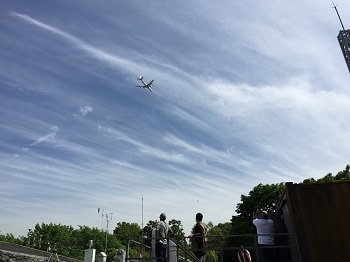An international team coordinated by NASA has recently investigated air pollution over the Korean peninsula. Two of IONICON’s PTR-TOFMS instruments were used to monitor volatile organic compounds (VOCs) in real-time aboard NASA’s DC-8 Flying Laboratory.
 NASA’s DC-8 Flying Laboratory over Seoul.
NASA’s DC-8 Flying Laboratory over Seoul.
The data gathered by scientists from the University of Innsbruck and Korea’s National Institute of Environmental Research (NIER) will be used to improve satellite-based air quality monitoring over Korea.
The project
Space agencies in Europe, the United States and Asia pursue an ambitious goal. In the next decade, the quality of the air over the entire northern hemisphere shall be continuously monitored from space. To accomplish this goal, NASA is carrying out research flights in the atmosphere over heavily polluted regions. The insights gained into composition and spatial distribution of air pollutants will improve the interpretation of future satellite imagery.
The collaboration
Teams from the University of Innsbruck and IONICON join their forces for participating in NASA’s campaigns. The most talented and experienced scientists use the newest and most powerful PTRTOFMS technology developed by IONICON engineers. IONICON CEO Lukas MÄRK explains the benefits of this cooperation:
It’s like going to space where instruments face their ultimate challenge. We are testing our newest developments under the most demanding conditions, and also benefit from the scientists’ experiences when starting to produce novel analyzers for our markets.
Lukas MÄRK
Flights over Seoul
NASA’s latest measurement campaign took the researchers to South Korea. 20 research flights were carried out over the Korean peninsula and over the Yellow Sea. A University of Innsbruck team led by Dr. Armin Wisthaler joined US and Korean researchers aboard the NASA DC-8 Flying Laboratory. "The newest PTR-TOFMS instrument detects smallest traces of gases that form particulate matter and ozone in the atmosphere, and is the best of its kind in the world“, says the Instrument Principal Investigator Armin Wisthaler who is also a professor at the University of Oslo.
Our measurements will help scientists in properly assessing air pollution from space and in understanding some of the current air quality problems in South Korea.
Armin Wisthaler
The University of Innsbruck and IONICON have been collaborating over many years for participating in NASA’s atmospheric research studies with the most advanced VOC monitoring instrumentation. These research and development activities receive support from the Austrian Space Applications Programme (ASAP) of the Austrian Research Promotion Agency (Österreichische Forschungsförderungsgesellschaft, FFG).
More information about the measurement campaign in South Korea: https://espo.nasa.gov/home/korus-aq/content/KORUS-AQ